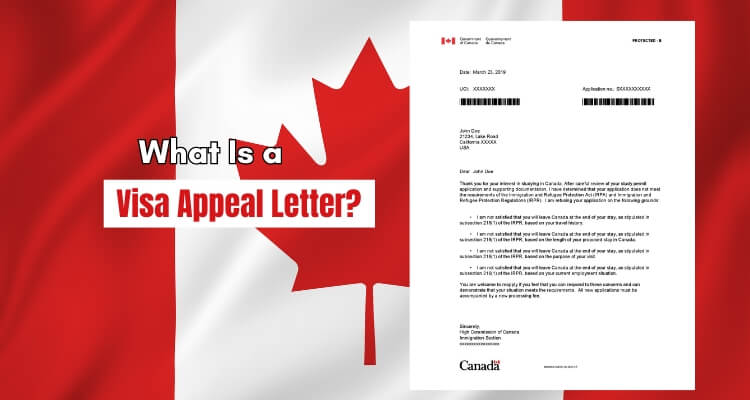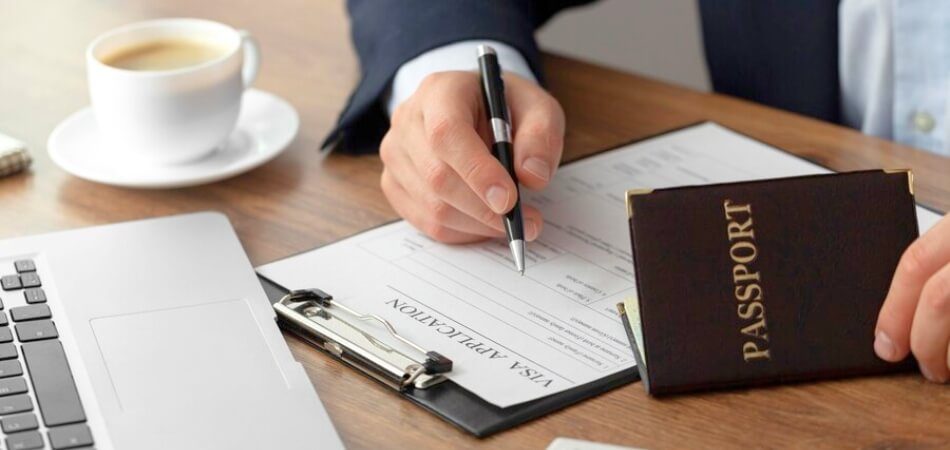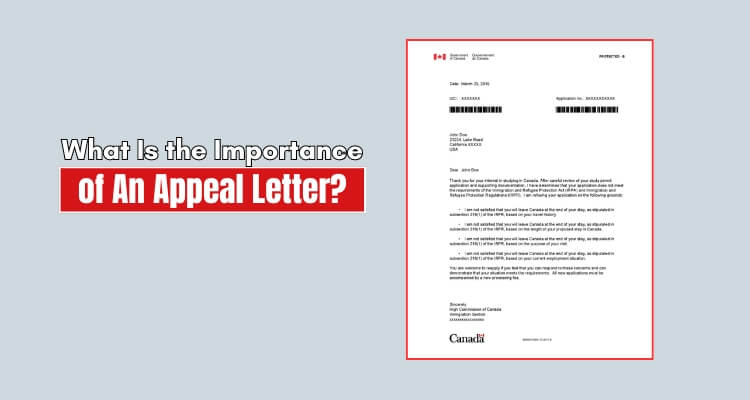Canadian visas enable international visitors to attend conferences, study, and work in Canada. It can be frustrating and disappointing when visa applications are denied. If you find yourself in this situation, you might wonder, “How Can I Write an Appeal Letter for a Canadian Visa to Attend a Conference?”
To write an appeal letter for a Canadian visa to attend a conference, clearly state your reasons for attending, provide additional supporting documents, and address any concerns raised in the denial. Be concise and polite, emphasizing your ties to your home country.
Follow the rest of this article to learn step-by-step instructions and tips for writing a compelling appeal letter that increases your chances of success.
What Is a Visa Appeal Letter?
A visa appeal letter is a formal document written to request reconsideration after a visa application has been denied. It’s crucial for individuals seeking to challenge the decision and provide additional evidence or clarification supporting their eligibility. The success of an appeal depends significantly on its structure and purpose.
The best visa appeal letters are clear and concise. Begin by expressing disappointment and briefly explaining your case. Describe any significant ties to the destination country, such as family, work, or education commitments.
In the second paragraph, focus on addressing the specific reasons for denial mentioned in the rejection letter. Provide new information or documents that counter these reasons and reinforce your case. Conclude by respectfully requesting a thorough review and expressing gratitude for the opportunity to present additional evidence.
Why is it Necessary to Have a Canadian Visa for a Conference?
It is true that attending a conference in Canada can be a rewarding experience. However, there are important steps to ensure smooth entry. One key requirement is securing a Canadian visa, which allows international attendees to legally enter the country. Understanding the reasons behind this requirement can help you prepare for your trip. Here are some essential reasons why having a visa is necessary for a conference in Canada.
Legal Entry into the Country
A visa is essential for gaining legal entry into Canada to attend the conference. Without the appropriate visa, you could be denied entry at the border. The visa ensures that you meet Canada’s legal requirements, protecting you from potential issues. This step is crucial, especially when attending a global conference in Canada 2024.
Verifying Your Conference Participation
When applying for a visa, you often need to provide proof of conference attendance. This verification helps the Canadian government ensure that your visit is legitimate and linked to professional activities. It also prevents the misuse of the visa system for unrelated purposes. By confirming your intent, it simplifies your application process.
Managing Immigration and Security Concerns
A visa allows the Canadian government to monitor who enters the country for security reasons. This process ensures that attendees are screened properly before they are granted access to the event. Managing immigration in this way helps protect both the country’s security and the integrity of international conferences. Such measures are standard across most countries hosting large-scale events.
Aligning with Conference Sponsorship Requirements
Some conferences, especially larger ones, may have specific sponsorship or invitation requirements tied to visa applications. Ensuring you have the correct visa demonstrates compliance with these rules. Additionally, it prevents last-minute issues that could arise at the border. It is better to handle these requirements well in advance to avoid unnecessary complications.
Ensuring a Smooth Conference Experience
Obtaining a visa ensures that your time in Canada is not disrupted by legal or administrative issues. You can focus entirely on the conference, networking, and making the most of the event. A visa grants you peace of mind knowing that everything is in order for your stay. Without this preparation, unforeseen challenges may affect your overall experience.
Obtaining a Canadian visa for a conference ensures that you comply with legal requirements, streamline your entry process, and avoid unnecessary stress. It’s always best to plan ahead and ensure all necessary documents are in place to guarantee a smooth and enjoyable conference experience.
What Are the Most Common Reasons for Denying a Canadian Visa?
Applying for a Canadian visa can be a complex process, and sometimes applications get denied. Knowledge of the common reasons for rejection can help you prepare a stronger application. Here are some typical factors that lead to a Canadian visa denial.
Incomplete or Incorrect Documentation
Applicants must submit all required documents accurately. Missing documents can lead to immediate rejection. Incorrect information or inconsistencies in your application can also be problematic. Always double-check your application before submission.
Insufficient Financial Proof
Visa officers need assurance that you can support yourself financially in Canada. Inadequate proof of funds can result in a denial. Providing bank statements, employment letters, and other financial documents is crucial. Ensure these documents demonstrate your financial stability.
Unclear Travel Purpose
Your travel purpose must be clearly stated and supported by evidence. Ambiguous or vague reasons can raise red flags. Include detailed itineraries, accommodation bookings, and any relevant invitations. Clear documentation helps visa officers understand your intentions.
Lack of Strong Ties to Home Country
Visa officers want to ensure you will return to your home country after your visit. Weak ties to your home country can lead to rejection. Show evidence of employment, family, or other commitments. Strong ties increase the likelihood of visa approval.
Criminal Background or Security Concerns
A criminal record or security concerns can result in a visa denial. Background checks are part of the visa process. Being honest about your history is essential. Address any past issues with clear explanations and relevant documentation.
How Can I Write an Appeal Letter for A Canadian Visa to Attend a Conference?
Writing an appeal letter for a Canadian visa refusal can be a crucial step in getting your application reconsidered. If you have been refused a visa to attend a conference, it’s important to address the reasons provided and support your case with additional information. This guide will help you write a clear and compelling appeal letter to increase your chances of success.
Step 1: Start with Your Personal Details
Begin by providing your full name, address, contact information, and visa application reference number. These details are essential to identify your application for review. Make sure to include the date of writing and the visa office’s address. These basic elements help the visa officer track your appeal effectively.
Step 2: Craft a Clear Subject Line
Your subject line should clearly indicate the purpose of your letter, such as “Appeal for Visitor Visa Refusal.” By doing so, the officer immediately understands that you are appealing a prior decision. Be sure to include your application reference number here as well. This step ensures that your request is recognized as part of an official process.
Step 3: Provide a Brief Introduction
Introduce yourself briefly and explain why you are writing this appeal letter. Mention your intention to attend a conference and emphasize its importance to your professional goals. For instance, getting a “conference visa to attending conference in Canada” may contribute significantly to your career development. Keep the introduction short but impactful.
Step 4: Address the Refusal Reasons
Carefully list the reasons provided for your visa refusal, and explain each in detail. For example, if financial insufficiency was mentioned, submit additional proof like updated bank statements or sponsorship letters. Addressing each reason thoroughly is key to persuading the officer to reconsider their decision. Attach any new documents that strengthen your case.
Step 5: Emphasize Your Ties to Home Country
Highlight your strong commitments to your home country to show you intend to return after the conference. These ties may include family, job, property, or ongoing studies. Demonstrating strong ties reduces concerns that you might overstay your visa. This helps assure the officer that your intentions are genuine and temporary.
Step 6: Request Reconsideration Politely
Conclude your letter by requesting the visa officer to reconsider your application based on the new information provided. Thank them for their time and attention to your case, reinforcing the professionalism of your request. Ensure that you maintain a respectful tone throughout. A polite appeal reflects your seriousness and commitment to addressing the issue.
For reapplying after a visa refusal, a clear and structured appeal letter is essential. By following these steps, you can provide a comprehensive explanation and support your case with relevant documentation, improving your chances of obtaining the visa.
What is the Importance of An Appeal Letter?
Writing an appeal letter is crucial when a decision does not go in your favor, especially for visa applications. This document provides a structured way to present your case and address concerns. Comprehension and its importance can significantly impact the outcome.
Provides a Second Chance
An appeal letter offers a second chance to present your case. It allows you to address issues and provide additional information. This is particularly important for demonstrating the benefit of attending the conference in Canada. Taking this opportunity can reverse a negative decision.
Clarifies Misunderstandings
Clarifying misunderstandings is a key aspect of an appeal letter. Sometimes, applications are denied due to misinterpretations or missing details. An appeal allows you to explain and correct these errors. This clarity can significantly improve your chances of success.
Demonstrates Commitment
Writing an appeal letter shows your commitment to the process. It indicates that you are serious about the opportunity and willing to go the extra mile. This dedication is often viewed positively by decision-makers. It reflects your determination and responsibility.
Provides Additional Evidence
An appeal letter allows you to provide additional evidence supporting your case. This could include new documents or information not previously submitted. Addressing the specific reasons for denial strengthens your appeal. It ensures that all relevant details are considered.
Personalizes Your Application
An appeal letter personalizes your application, giving it a human touch. It allows you to share your story and explain your circumstances. This personal connection can make your application more compelling. It helps the decision-maker see you as more than just a file.
Tips to Consider While Re-applying for a Canadian Conference Visa
Re-applying for a Canadian conference visa can feel daunting, but there are key strategies to improve your chances. Taking the right steps and ensuring all information is accurate will make the process smoother. Here are some essential tips to keep in mind when resubmitting your visa application.
- Carefully review the refusal letter to understand the exact reasons for the denial. Address each reason in detail when providing new documents.
- Update all supporting documents, such as bank statements or sponsorship letters, with the most recent information available. This ensures accuracy in your re-application.
- Double-check your travel itinerary and purpose of visit to ensure clarity. Your explanation must clearly state why attending the conference is vital.
- Highlight any strong ties to your home country that demonstrate your intent to return after the event. Include family, job, or property details.
- When you are resubmitting conference visa application in Canada, make sure to address any concerns about financial stability. Showing strong financial backing can strengthen your application.
A careful, thorough approach increases your likelihood of success when reapplying for a Canadian conference visa. Be sure to address previous refusal reasons and update your documents to reflect your current situation.
FAQs for How Can I Write an Appeal Letter for A Canadian Visa to Attend a Conference?
Writing an appeal letter for a Canadian visa denial can be daunting, especially when attending an important conference. Here are ten frequently asked questions and their answers to guide you through the process.
Should I Mention My Ties to My Home Country in The Appeal Letter?
Yes, emphasizing your ties to your home country is crucial. Highlight your family, property, and employment connections that ensure your return after the conference. This demonstrates your intent to comply with visa rules.
How Long Should My Appeal Letter Be?
Keep your appeal letter concise and to the point. Ideally, it should be no more than one to two pages long. Focus on clarity and relevance to ensure all key points are covered without unnecessary information.
Is It Necessary to Provide a Detailed Itinerary for the Conference?
Providing a detailed itinerary can strengthen your appeal. It shows your commitment and preparation for the conference. Include dates, times, and specific sessions or events you plan to attend.
How Should I Conclude My Appeal Letter?
End your letter with a respectful request for reconsideration. Express gratitude for their time and attention. Provide your contact information for any further inquiries, ensuring it’s easy to find and accurate.
Can I Appeal a Visa Denial More than Once?
While it’s possible to appeal more than once, it’s essential to address the reasons for the initial denial comprehensively in your first appeal. Multiple appeals without new information may not be effective. Seek professional advice if needed.
Final Thought
A Canadian visa appeal letter involves several crucial steps that can significantly impact your success. You can strengthen your case by addressing the reasons for denial and providing additional supporting documents. To increase your chances of a positive outcome, present your appeal professionally and respectfully.
This process can be managed by understanding “How Can I Write an Appeal Letter for a Canadian Visa to Attend a Conference?” Address the visa officer properly, state your purpose clearly, and explain the importance of the conference. The key to a successful appeal is providing additional evidence and emphasizing your ties to your homeland.
A well-written appeal letter offers a second chance to clarify misunderstandings and demonstrate commitment. Make a compelling case for reconsideration by following the detailed steps and tips provided. Consult reliable sources such as the Global Conference website for further guidance.








